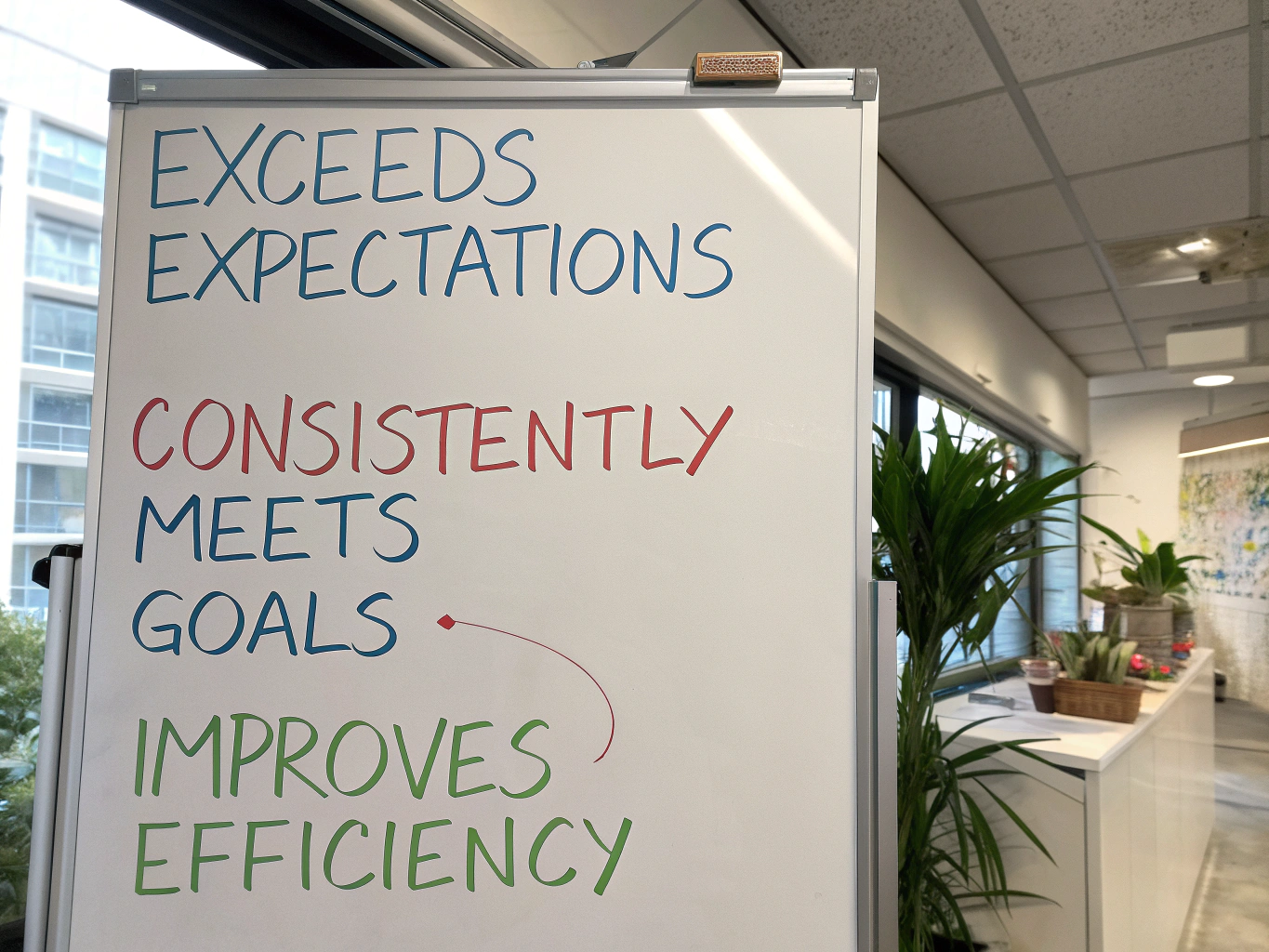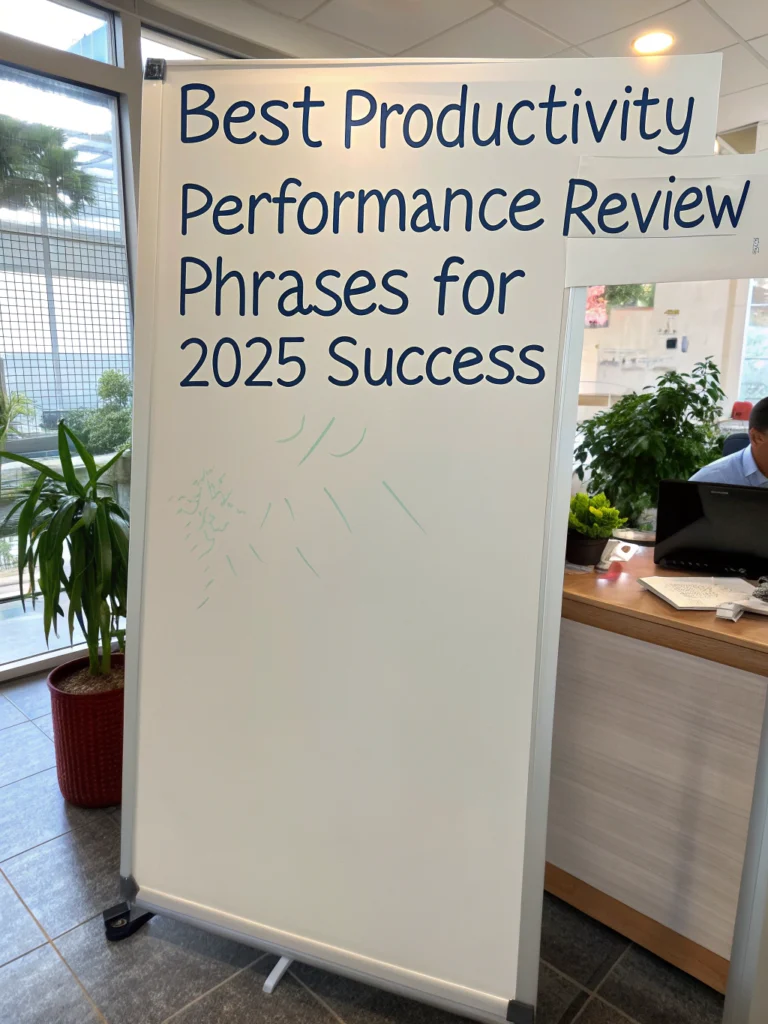Best Productivity Performance Review Phrases for 2025 Success
Looking for powerful productivity performance review phrases to elevate your team's efficiency in 2025? You've landed in the right place. As a manager or team leader, the words you choose during performance evaluations can make or break employee motivation and productivity growth.
Why Effective Productivity Review Language Matters in 2025
In today's hyper-competitive business landscape, productivity isn't just about working harder—it's about working smarter. Using the right performance review phrases for productivity can highlight strengths, address weaknesses, and chart clear paths for improvement.
According to recent workplace studies, employees who receive specific, actionable feedback are 39% more likely to be engaged and productive. That's why mastering the art of productivity evaluation language is more crucial than ever in 2025.
Positive Productivity Performance Review Phrases
When acknowledging stellar performance, these employee productivity evaluation phrases can make your top performers feel truly valued:
• "Consistently exceeds productivity targets while maintaining exceptional quality standards"
• "Demonstrates remarkable efficiency in handling multiple high-priority projects simultaneously"
• "Has developed innovative workflows that have increased team productivity by X%"
• "Shows exceptional time management skills that elevate the entire team's performance"
• "Consistently completes tasks ahead of schedule, allowing for additional projects to be tackled"
• "Has mastered the art of prioritization, ensuring critical deadlines are never missed"
Pro tip: Always pair these positive phrases with specific examples to make your feedback more concrete and meaningful.
Constructive Productivity Improvement Phrases
Need to address areas for growth? These improving productivity feedback examples provide direction without demotivating:
• "Would benefit from developing more structured planning techniques to enhance output consistency"
• "Could improve productivity by establishing clearer priorities when managing multiple tasks"
• "Has potential to increase efficiency by leveraging available productivity tools more effectively"
• "Should focus on reducing time spent on low-value activities to increase overall output"
• "Would benefit from setting more realistic timelines to avoid last-minute rushes"
• "Could enhance productivity by implementing more effective delegation strategies"

2025's Most Impactful Performance Review Strategies
The most effective 2025 performance review tips combine clarity, specificity, and actionability. Here's how to maximize the impact of your productivity reviews:
-
Balance quantitative and qualitative feedback: "Increased department efficiency by 17% while maintaining our most positive client satisfaction ratings."
-
Focus on growth rather than fixed traits: "Has shown remarkable improvement in project completion rates through consistent application of new time management techniques."
-
Connect individual productivity to broader goals: "Your increased productivity has directly contributed to the team exceeding quarterly targets by 12%."
-
Incorporate technology adoption: "Has mastered new productivity software, resulting in 30% faster completion of routine tasks."
For leaders looking to revolutionize their productivity systems, the >AI for Productivity eBook + Checklist: Supercharge Your Efficiency in 2203 offers cutting-edge strategies that complement these review techniques.
Phrases for Remote Work Productivity
With hybrid and remote work becoming standard in 2025, these effective performance review statements address the unique challenges of distributed teams:
• "Consistently maintains high productivity levels despite remote work challenges"
• "Has developed exceptional virtual collaboration skills that enhance team efficiency"
• "Demonstrates remarkable self-management in the remote environment"
• "Effectively uses digital tools to maintain seamless workflow and communication"
• "Has created innovative virtual workflows that have increased team productivity"
Looking for specialized productivity solutions for team members with ADHD? Check out the comprehensive >ADHD Productivity Power Pack: Ebooks, Guides, Checklists, Workbook & Tools to Master Focus, Time Management & Organization for tailored strategies.
Performance Review Phrases for Different Productivity Aspects
Time Management
• "Consistently adheres to deadlines and effectively manages competing priorities"
• "Would benefit from more realistic time estimations for complex projects"
• "Excels at eliminating time-wasting activities from their workflow"
Quality of Work
• "Maintains exceptional quality standards while meeting all productivity targets"
• "Should focus on reducing error rates while maintaining current output levels"
• "Has found an ideal balance between speed and accuracy in deliverables"
Initiative and Innovation
• "Regularly suggests process improvements that boost team efficiency"
• "Has developed three new workflows that reduced processing time by 25%"
• "Could enhance productivity by more actively seeking efficiency opportunities"
Need more innovative productivity approaches? Our guide on top productivity books to boost efficiency offers valuable insights from industry experts.
How to Deliver Productivity Feedback Effectively
Even the best best productivity review comments fall flat without proper delivery. Follow these guidelines:
-
Be specific: Vague feedback like "you need to be more productive" is meaningless. Instead, say "I've noticed your project completion rate is about 75% of our team average."
-
Focus on behaviors, not personality: "Your tendency to multitask has led to missed deadlines" works better than "You're disorganized."
-
Provide actionable next steps: Pair criticism with clear improvement paths, like "Let's implement a task prioritization system that can help you focus on high-value activities first."
-
Acknowledge improvement: "Your productivity has increased by 15% since our last review, showing your commitment to growth."
Looking for more structured approaches? Our productivity report template guide can help you establish consistent evaluation frameworks.
Creating Personalized Development Plans
The most effective reviews don't just evaluate past performance—they chart clear paths forward. Here's how to create personalized productivity development plans:
- Identify specific productivity strengths and weaknesses
- Set measurable productivity goals with realistic timelines
- Recommend specific tools, trainings, or resources
- Establish regular check-ins to monitor progress
- Adjust goals as necessary based on changing circumstances
For teams struggling with focus, our meditation and productivity hacks article offers complementary strategies that can enhance performance.
Common Productivity Review Mistakes to Avoid
Even experienced managers make these productivity review errors:
• Recency bias: Focusing only on recent performance instead of the entire review period
• Lack of specificity: Using generic terms instead of concrete examples
• Avoiding difficult conversations: Glossing over productivity issues that need addressing
• Comparing employees: Each evaluation should focus on individual performance against standards
• Neglecting to follow up: Performance reviews should initiate ongoing productivity discussions
FAQs About Productivity Performance Reviews
How often should productivity be formally reviewed?
While annual reviews are standard, quarterly productivity check-ins allow for more timely feedback and adjustments. Many high-performing organizations now implement monthly or even bi-weekly informal productivity discussions.
Should productivity metrics be the same for all team members?
No. While some baseline productivity metrics might apply team-wide, effective reviews consider individual roles, experience levels, and strengths. For example, a creative designer and a data analyst would have entirely different productivity metrics.
How can I measure productivity fairly in creative roles?
For creative positions, balance quantitative metrics (projects completed, turnaround time) with qualitative assessments (innovation level, problem-solving approach). Client feedback and peer evaluations can provide valuable additional perspectives.
How should productivity reviews differ for remote vs. in-office employees?
Focus on outcomes rather than process for remote workers. Instead of measuring hours online, evaluate deliverables, quality standards, and contribution to team goals. Add metrics around communication effectiveness and virtual collaboration.
What's the best way to address productivity declines?
Start with curious inquiry rather than assumption. Many productivity issues stem from unclear expectations, insufficient resources, or personal circumstances. Create a safe space for honest discussion before implementing improvement plans.
Conclusion
Mastering productivity performance review phrases is an essential skill for effective management in 2025. By combining specific feedback, clear metrics, and actionable development plans, you can transform routine evaluations into powerful productivity drivers.
Remember that the ultimate goal isn't just documenting performance—it's inspiring growth, recognizing excellence, and building a culture where continual productivity improvement becomes the norm.
Want to take your team's productivity to the next level? Explore our efficiency productivity difference guide to better understand the subtle distinctions that can transform your organizational performance.

